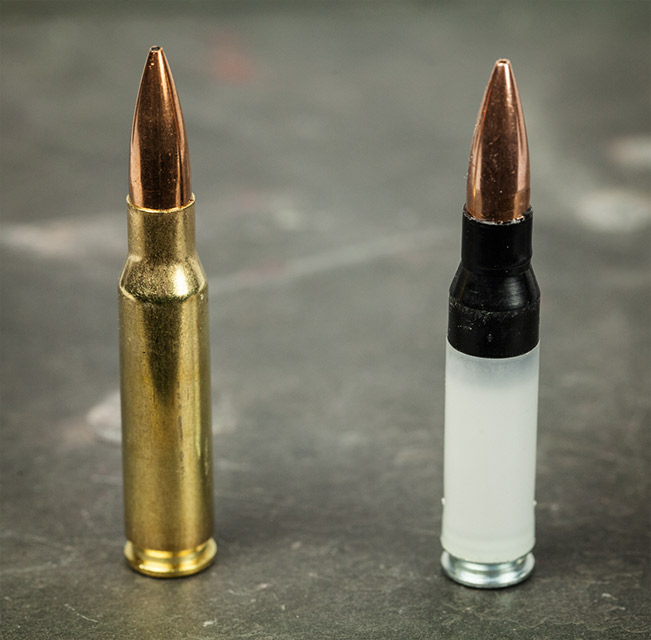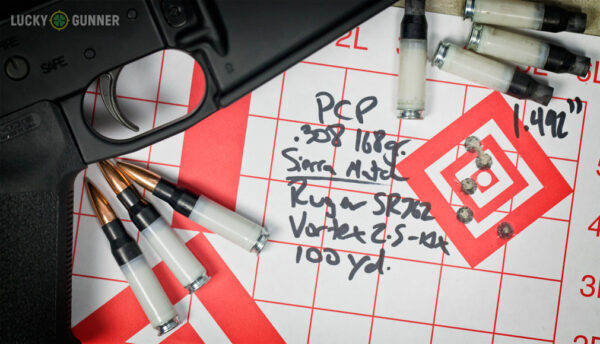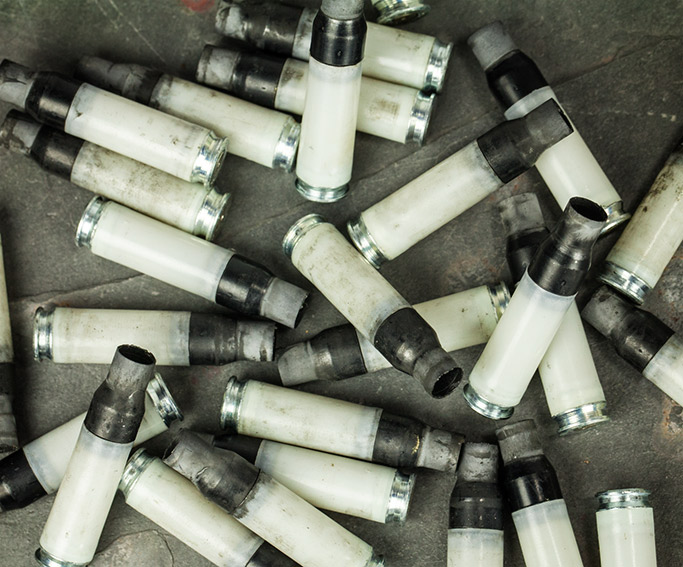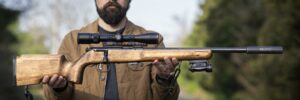We’re taking a quick break from Make Up Your Mind Monday this week in order to bring you a review for PCP; a new polymer cased rifle ammo that’s just recently become available in limited quantities and, for now, only in the .308 Winchester cartridge. I had a chance to test out a few boxes of this ammo recently, and you can see the results in the video above.
We teased this review a couple of weeks ago with an image on Facebook, and you guys immediately had a ton of questions and comments. Understandable, considering the unique nature of the product . In addition to the product demo, we talked to Tony Padgett from PCP last week and passed along a few of the questions you asked.
Q&A with Tony Padgett from PCP
Lucky Gunner: A lot of people are asking about whether PCP can be reloaded. The PCP website says that it’s not recommended at this time. Can you elaborate on that?
Tony Padgett: The case capacity is different. It’s slightly less than a standard .308 case so if you take your typical load recipe out of a book, those pressures are not going to be the same. You could take a max load of a powder that doesn’t fill to full capacity and put that in our case and get significantly higher pressures because the capacity is different. We’re still talking through the business aspects for just selling cases. We have several ammunition manufacturers who are interested in loading polymer cases in their name and everything else. I would expect at some point we’ll put some information out on those loads we feel work well. At this point, we haven’t loaded a whole lot of different projectiles. We only typically use about four different projectiles [for .308]; 168, 175, we shot a lot of 180 ball for military stuff but we haven’t targeted the reloaders yet. Our ballistician somehow manages to shoot a lot more than the number of cases we give him. But we cannot recommend that it should be promoted at this point. We know that our loads are safe but we can’t say if others will be.
“The [PCP] case capacity is different. It’s slightly less than a standard .308 case so if you take your typical load recipe out of a book, those pressures are not going to be the same.”
LG: Is there any chance we’ll ever see PCP ammo loaded with expanding bullets for hunting?
TP: We’re actually looking at that right now. Component availability is still challenging at this time. The big thing is trying to find projectiles that work with our current inventory of powders. We can’t make large changes in our projectiles and still use the same powders. Right now, we’re looking at 165 grain Sierra GameKing and we’ve had great luck with that one. That’s probably the first one we’d put out hunting-wise. We’re still collecting information from this initial release. We’re hoping the majority of the people who did participate will fill out the questionnaire and get us that data.
LG: What do you believe this ammunition offers that a traditional brass cased round does not?
TP: It depends on the shooter. Obviously, the initial design goal was to reduce the weight; achieve the same performance as M80 ball and reduce the weight. Our cases weigh about half of what a brass case weighs. We have found other benefits. For instance, reduced chamber temperatures.

LG: We’ve read that PCP Ammo doesn’t transfer as much heat to the chamber of the firearm as some brass rounds might.
TP: The chamber does remain cooler with ours, based on government testing done at Fort Bragg. In one case, they ran a string of 300 to 400 rounds through an M249 then they shoved their finger in the chamber right after. I wouldn’t recommend doing that with brass ammo.
LG: Is there an advantage to a cooler chamber? Isn’t the barrel still getting hot from the gases that propel the bullet out?
TP: Your chamber will get hot because that heat is going to conduct through the barrel back to the chamber. Typically, metals will wear more when they’re hot. So in applications where you are heating things up significantly, it will reduce wear. But it’s not your typical shooter that will notice that – it’s machine guns – things like that. For most people, we have found that they get better accuracy from our cases than a typical brass case. That’s a tough thing to prove because if you’re shooting our factory load, that’s not really optimized for any firearm, it’s built to be used in gas guns, bolt guns, different chamber configurations. If you’re a handloader, you’re going to get better performance out of whatever is configured for your gun. However, if you take a polymer case versus a brass case, you’re going to see better groupings with the polymer case. You get better powder ignition because one of the things that happens when the cartridge is fired — the powder in the case that is along the walls of the brass case, burns much, much slower because the brass case is absorbing that heat and transferring it to the chamber. It doesn’t burn as consistently. If you put an insulator in there, the powder can burn much more efficiently. More consistent powder burn leads to better precision.

“We don’t see this being the ammo you go blow through at the range for a day of fun. We’ll always be more geared toward precision shooters.”
LG: When will PCP Ammo be more widely available?
TP: We’re waiting to get the feedback to determine if we want to make changes to the load. We’re ready to produce now. We are production ready but before we run a couple hundred thousand rounds in a week we want to make sure we have what we want to put out there.
LG: For this first limited run of ammo, PCP is priced at about $2 per round. What do you anticipate the actual MSRP will be when launched nationally?
TP: It’s tough to give a price but I can say as our volumes go up, we’ll be able to bring our costs down. Those savings will be passed on. As we’re able to refine our processes, I’d expect our price to come down quite a bit… We don’t want to be the most expensive thing out there, but I don’t see us being the cheapest thing out there at this point. We don’t see this being the ammo you go blow through at the range for a day of fun. We’ll always be more geared toward precision shooters. If we’re making a quality product, we don’t want to use sub-precision components. However, things like a government contract would allow the price to come down even more.
PCP ammo is now available directly from PCP in limited runs. Sign up on their website to be notified when their next batch is on sale. If you have any other questions about PCP ammo not covered here, let us know in the comments and we’ll try to ask the PCP guys when we head off to SHOT show next week.





Always looking for new ideas; it looks like this one may have a chance!
Would love to see this come out in a 223.
It still has metal inserts, until they come out with a full polymer case, then it will be completely revolutionary, and 3D printable, with that said, very cool definitely taking a leap of faith in trying new ammunition manufacturing techniques…let's hope it works..and works WELL!
I have a box of polymer cased .223 a friend gave me…I have had it for years…never shot it…just put it aside…it is very lightweight….twenty rounds weigh about what 20 spent cases weigh
I don't believe this will have a military application. It looks too delicate for real life field use.
Have to depend on being able to reload as much as I enjoy shooting
If it goes commercial It should go for around $10.00 a box not $20.00.
Always looking for new ideas it looks like this one may have a chance!
Would love to see this come out in a 223.
Another non-reloadable round. When all ammo is non reloadable, the end is near.
I have a box of polymer cased .223 a friend gave me…I have had it for years…never shot it…just put it aside…it is very lightweight….twenty rounds weigh about what 20 spent cases weigh
Erich, I believe what you have is the PCA . In essence, PCP are trying to succeed where PCA failed. The design they cam up with, that weld in the middle, is an old design that the people at PCA played with before Natec ( PCA producer at that time) went under. If you ever wonder why there’s a black part on the PCP, it is basically for laser welding, it will only work on black polymer, unless they are doing the eternal sin of gluing the product somehow, thus increasing it’s fragility (and cost). But I will believe there’s no laser weld when I see them producing in another color. But at least the PCA (in .223) were selling around $.45 a round in those days. The main reason for polymer production is not just to cut down the weight of the round but also to cut the cost, and they did not achieve that. I like you, have around 400 rounds of the PCA (.223) that I kept and sort of don’t want to shoot. But I can tell you that I have literally shot thousands of rounds of the PCA, and had Natec survived the turmoil it was in among partners/investors and what have you, they would have fine tuned their round to a very acceptable one. And all this bull that I read above about reloading, forget it, never going to happen. The re-loader will never be able to achieve enough “crimp” on the projectile to have acceptable “pull”. The projectile in reality have the polymer injected around it, and the pull ( which in the case of the 223 should be a minimum of 45lbs – SAMMY reg) can be adjusted by different sizes of the cannelure around the projectile. I believe PCP are using some kind of glue to put the projectile in, which honestly is not the safest of methods, plus, I do not know what “pull test” can they get with this method. The problem is, if they increase the strength of the glue, the neck of the case will detach and there’s a big chance it will stay in the barrel (thus gumming the gun). So all of this will not permit the PCP case to be reloaded.
I took another look, and this was posted in January 2104 not 2015… One year later, and we still have no sign of success for the PCP
I don’t believe this will have a military application. It looks too delicate for real life field use.
Have to depend on being able to reload as much as I enjoy shooting
If it goes commercial It should go for around $10.00 a box not $20.00.
Right now it is $40/20. This will never fly. It hasn’t worked well for the 30+ years it has been tried. Even low-pressure .38 Special cases failed.
Another non-reloadable round. When all ammo is non reloadable, the end is near.
What in the world is the advantage that justifies $2.00 / rnd ?
NO NO NO……….First PCP is bad for everything other then not helping the earth…..They are cheaper and make u pay more wtf!!!! PcP is cheap ass fuck and easy to make and will last longer then a roach.. PCP is made to last 100 life times no matter where it is…And after one use form a bullet its done no more cant use again fing dip shits came up with this to take your monye!!!! Pay duble the price for somthing u cant use again!!! the extream heat will worp the plastic and the shells will be left where they where shot at for the next 1000 years!!!!! PCP AMMO A REALLLLY BAD IDEA!!!!!!!!!!!!!
Worked in plastics for over 4 years and if the plastic even got discolored after 50 years of sun light it was consider bad!!!!!
What in the world is the advantage that justifies $2.00 / rnd ?
This really isn't a review. How is this ammunition different than the failed (but DARPA financed) PCA Spectrum polymer-cased ammunition? That attempt also provided a significant weight reduction and when it worked (WHEN IT WORKED) was acceptable ammunition. But, when it didn't work (usually due to cases failing to extract, with the brass 'cup' base pulled off) it was awful.
I have used ammo like this in the past, they were polymer cased .223 tracers. Total garbage, the extractor would rip the bottom of the case off when it would eject the round… too much down time knocking cases out of my chamber. I'll pass.
This really isn’t a review. How is this ammunition different than the failed (but DARPA financed) PCA Spectrum polymer-cased ammunition? That attempt also provided a significant weight reduction and when it worked (WHEN IT WORKED) was acceptable ammunition. But, when it didn’t work (usually due to cases failing to extract, with the brass ‘cup’ base pulled off) it was awful.
I have used ammo like this in the past, they were polymer cased .223 tracers. Total garbage, the extractor would rip the bottom of the case off when it would eject the round… too much down time knocking cases out of my chamber. I’ll pass.
Plastic is cheap. Brass is expensive. End of story. It has nothing to do with case weight. It's just about higher profits for the manufacturer.
Plastic is cheap. Brass is expensive. End of story. It has nothing to do with case weight. It’s just about higher profits for the manufacturer.
Cool!
Cool!
Depending on if brass is in short supply, polymer case ammo might be the only option. Materials are not in infinite supply. This might be an interesting long-term solution.
Depending on if brass is in short supply, polymer case ammo might be the only option. Materials are not in infinite supply. This might be an interesting long-term solution.
not in 223..what a shame
not in 223..what a shame
I just tested this stuff in .308. The weight difference in plan speaking is that you can carry 23 rounds for every 20 brass rounds. Then you have the cost. At $50 a box is it really worth saving a few grams in weight. Not to mention you can't reload the cases.
What's the big deal of cost? There are winchester, remington, hornady, etc, etc. That sell from $35-$45 for a box of 20 rounds. So why are you people acting so surprised at $2 a round for pcp ammo?! When these established ammo companies bring down the cost of ammo to around $16-$23 for a box of 20 rounds. Then you can start whining about $2 a round ammo!!
What’s the big deal of cost? There are winchester, remington, hornady, etc, etc. That sell from $35-$45 for a box of 20 rounds. So why are you people acting so surprised at $2 a round for pcp ammo?! When these established ammo companies bring down the cost of ammo to around $16-$23 for a box of 20 rounds. Then you can start whining about $2 a round ammo!!
There is a big difference between $2/rds for something like Federal GMM where the first firing using 5-20% of the brass life (or at least 30% of brass resale value) and $2/rds for a single-use of the most expensive component of the round.
Consider it this way:
SMK bullet – 0.35
Powder charge – 0.15
Primer -0.04
Brass -$0.75-1.25 (you lose 5-30% of value per firing)
Plastic – $1.55, you lose 100% of this per firing
That makes these rounds 2-4 times more expensive to shoot, and they will never have the accuracy potential of fire-formed brass.
Right now it is $40/20. This will never fly. It hasn't worked well for the 30+ years it has been tried. Even low-pressure .38 Special cases failed.
The commercial technology has been tried for over 30 years. First in .38 Special. Cases failed even at those very low pressures. The ammo took proprietary bullets having a rebated heal. In concept it is attractive, but it doesn't work. I would never use this ammo for practice let alone in defense.
Speculation here: I think the patent holders are simply trying to get enough bucks together, thinking they have finally solved all the defects in the design and material. Trying to limit their loses. The plastics used cannot do what they ask. Making a three piece case is just asking for trouble.
The commercial technology has been tried for over 30 years. First in .38 Special. Cases failed even at those very low pressures. The ammo took proprietary bullets having a rebated heal. In concept it is attractive, but it doesn’t work. I would never use this ammo for practice let alone in defense.
Speculation here: I think the patent holders are simply trying to get enough bucks together, thinking they have finally solved all the defects in the design and material. Trying to limit their loses. The plastics used cannot do what they ask. Making a three piece case is just asking for trouble.
There is a big difference between $2/rds for something like Federal GMM where the first firing using 5-20% of the brass life (or at least 30% of brass resale value) and $2/rds for a single-use of the most expensive component of the round.
Consider it this way:
SMK bullet – 0.35
Powder charge – 0.15
Primer -0.04
Brass -$0.75-1.25 (you lose 5-30% of value per firing)
Plastic – $1.55, you lose 100% of this per firing
That makes these rounds 2-4 times more expensive to shoot, and they will never have the accuracy potential of fire-formed brass.